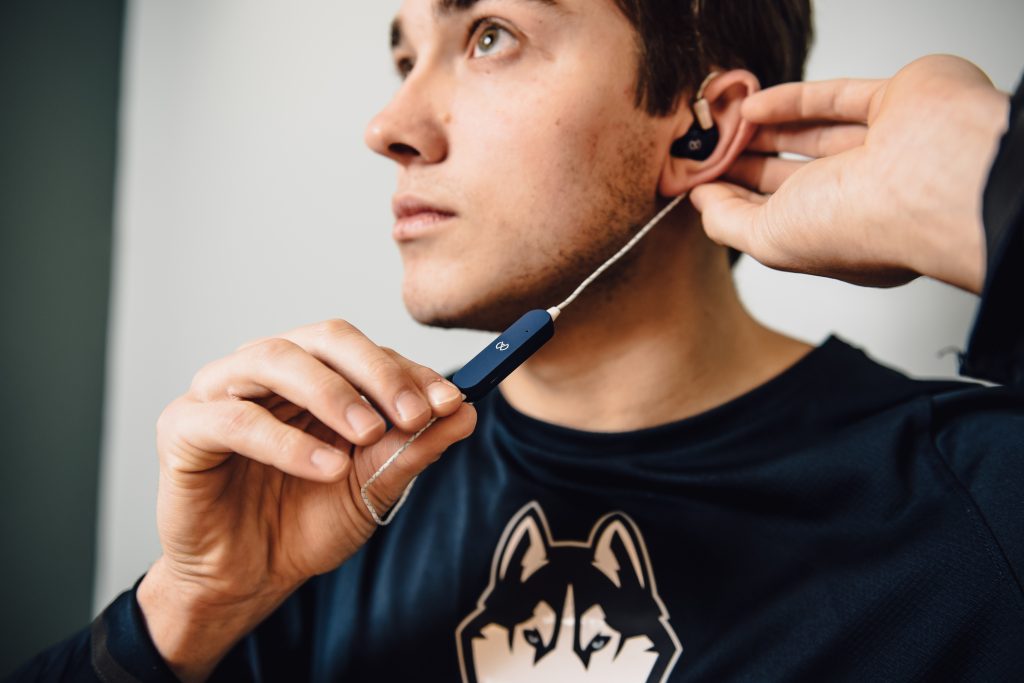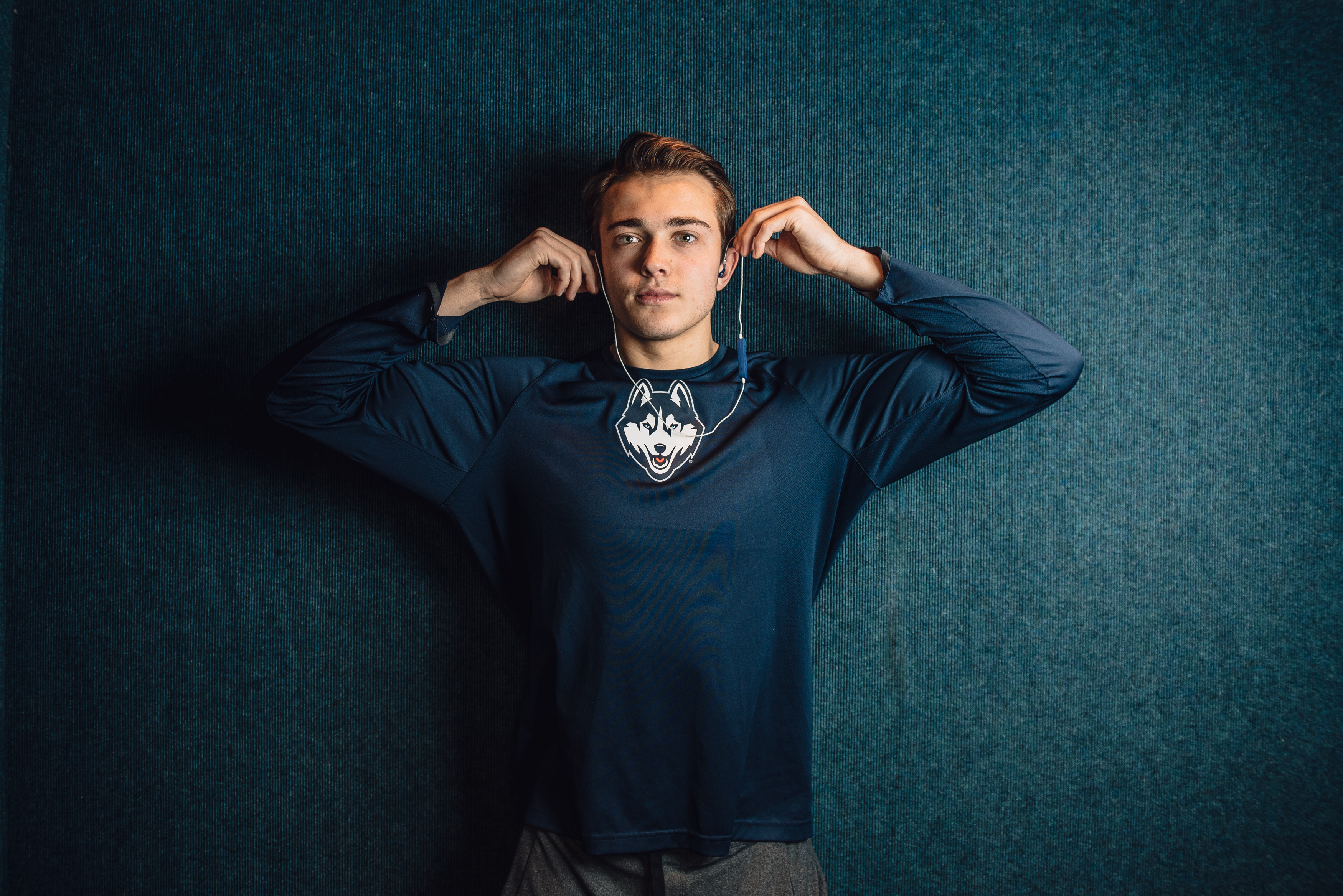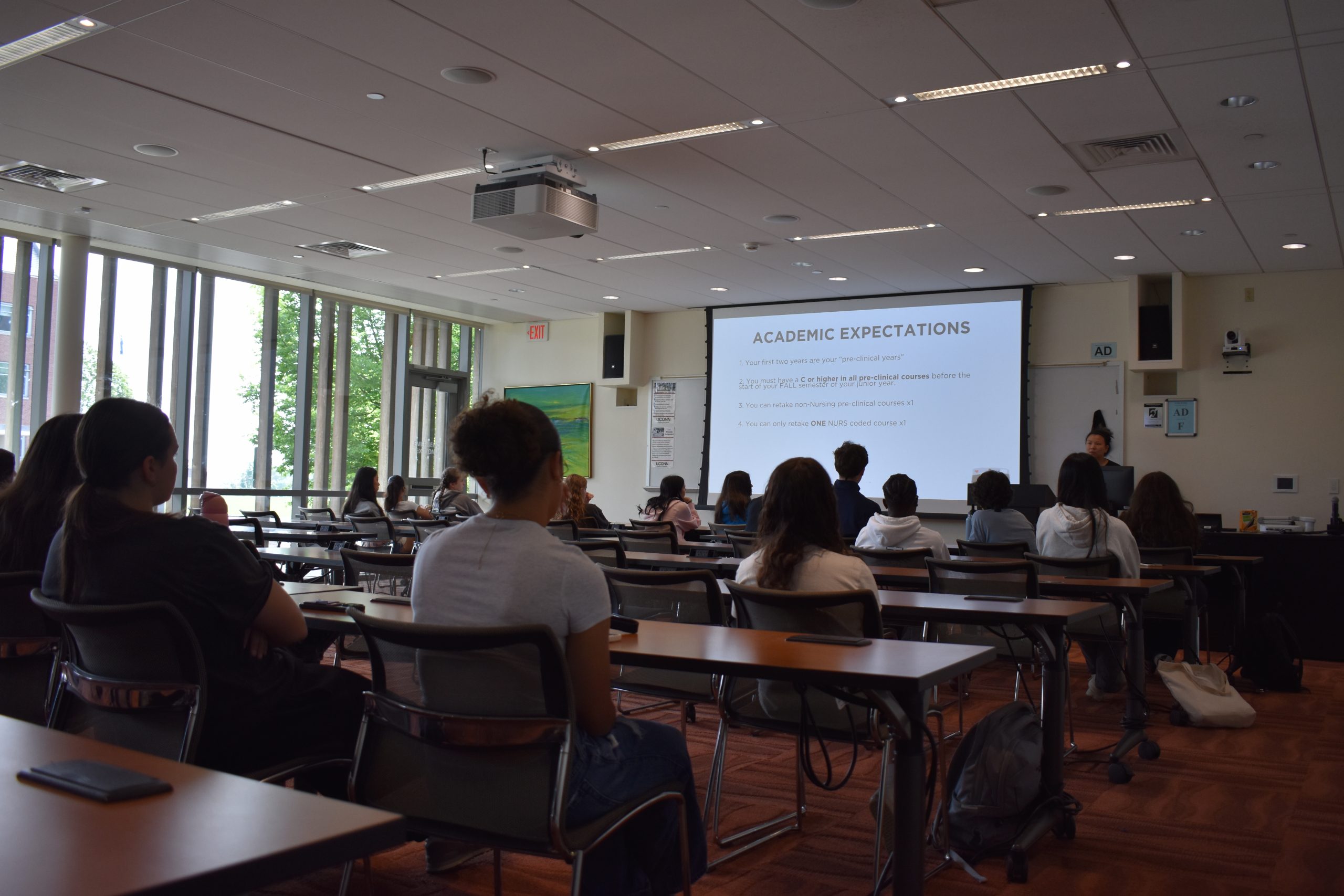By their sophomore year in high school, Ben Grosse ’21 (BUS) and his good friend Bharat Pulgam had amassed an impressive collection of broken earbuds. But their parents were less than impressed at the bills for replacement sets.
Grosse and Pulgam knew they weren’t alone. They identified a demand and launched mXers audio—a company that creates customizable earbuds that allow users control over the color, style, fit and sound of their audio devices.
Now co-owner and sales director of the $100,000-a-year company, Grosse, 18, recently shared the story of his business journey with students at UConn’s new Peter J. Werth Institute for Entrepreneurship and Innovation (formerly the NextGen Residence Hall).
Grosse is fitting the presentation in between classes, a 3 a.m. conference call with the company’s supplier in China, planning the launch of a new “intense bass’’ product line, and making arrangements for pop-up and VIP Super Bowl demo parties.
“It’s definitely hard, but you learn to love it,’’ Grosse says. “You do it because you love your business and what you’re doing. That’s what drives you. You are building something for yourself.’’
Grosse and Pulgam, now the company’s CEO, began their quest to create a better product in 2015, in an 18- by-10 foot basement room with only a high school marketing class and some YouTube videos as guidance.
Their first prototype, which was partly made of clay and a competitor’s device, was developed in early 2016, and the young men received a provisional patent. The first real set of earbuds was created in July of 2016, with the project self-funded by the founders. By September, they were selling their earbuds online, at shows and at the University of Minnesota.

mXers Technologies LLC now sells modular earbuds with five distinct and interchangeable parts that can be customized to the type of music or sound to which the user is listening, and range in cost from $35.99 to $90. There’s a device for rap and heavy metal, one for softer music, and a third for non-musical listening, says Grosse.
Although Grosse can’t talk about sales numbers due to a non-disclosure agreement, the earbuds are currently sold through Amazon, the company’s web site, and are under consideration by Target.
“What’s undervalued by perspective entrepreneurs is the ‘Why?’ factor. Why should you buy our earbuds—or any other product?,’’ Grosse says. “We created a high-quality, innovative product that stands out in a highly saturated earbud market. We made a product that offers exceptional bass, upper echelon appeal and versatility for athletes–all in one product.’’
A sourcing agent helped Grosse and Pulgam find a reputable factory willing to safeguard their trade secrets. They also received advice from Fortune 500 company mentors, including senior vice presidents at Best Buy and Target.
The pair, who grew up outside Minneapolis, Minn., branched out and offered entrepreneurship events, including start-up weekends for other entrepreneurs. “We realized that this is much more than growing a business, you have to grow a start-up community,’’ Grosse says.
UConn ‘Just Clicked’
Grosse said he had long been a fan of UConn athletics and added the college to his tour of East Coast universities. “It just clicked right away,’’ he notes.
A School of Business student, Grosse has sought advice from key business supporters on campus, including Professor David Noble, director of the Werth Institute; Kathy Rocha, managing director of entrepreneurship; and the Connecticut Small Business Development Centers.
Grosse also accepted a position as student adviser to the Werth Institute, created in December 2017 with a $22.5 million gift from pharmaceutical entrepreneur Peter. J. Werth to foster entrepreneurship and innovation that has commercial application.
“We are excited to have Ben help shape our programs from the student perspective,’’ Noble says. “This is a place where students with big dreams will thrive. We hope to identify other students, across many schools and programs, who are equally excited about entrepreneurship.’’
And, Grosse says, he knows there is much to learn. “I feel like I’ve got four years to learn and dig deeper into business. I’m eager to grow!’’
Owning a business is rewarding, but is not without its drawbacks, says Grosse.
“One thing I’ve learned is patience!,’’ Grosse said. “It took a year from prototype to getting a product in hand. That’s especially important when you don’t have a ton of capital. Also, we learned that something will always go wrong, but you have to bounce back and stay strong and keep driving.’’
Grosse is already exploring new entrepreneurial projects. A fan of surfing and rock climbing, he has an idea for an innovation for the action-sports industry.
“I remember the moment when we first held our new earbuds and thinking, ‘Wow! We can actually do this! We’re listening to music through earbuds that we made,’ ’’ he said. “Whenever I’m discouraged about something, I think back to those moments.’’



